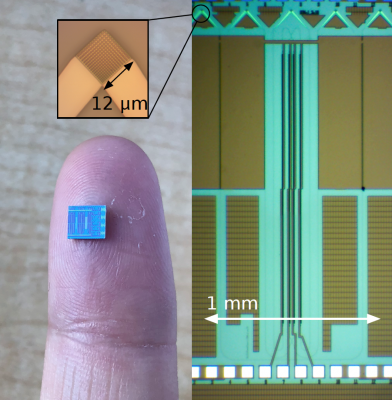
The only method of securing long-distance communication against the emerging threat of quantum computers is quantum key distribution (QKD), a cryptographic protocol that relies on aspects of quantum mechanics. Despite significant progress over the past decades, QKD has not been widely adopted, primarily because of lackluster transmission rates; bulky, inconvenient hardware; and high costs. Additionally, while polarization is a reliable degree of freedom for QKD over free-space channels, it is too unstable over fiber channels. Here, we overcome these challenges by designing a miniaturized, high-speed, polarization-based QKD encoder on a silicon photonics chip.
Our chip leverages processes used extensively in the semiconductor industry, making it easily mass producible. The encoder consists of an interferometer that controls the direction of light propagation inside the chip and a two-dimensional grating coupler that converts the propagation direction into polarization in an optical fiber. This simple architecture can encode information in polarization with near-perfect fidelity at a rate of 10 Gbps. It can also actively compensate for polarization drifts incurred over a fiber link. We demonstrate the utility and feasibility of our system in the Boston metro area by conducting the first intercity field test of a chip-based QKD encoder, achieving secure communication rates an order of magnitude above those of previous chip-based demonstrations.
Our results prove that polarization-based QKD, contrary to previous assumptions, is well suited for fiber channels and that silicon photonics is an indispensable asset in building a scalable, high-speed, quantum-safe, metropolitan communication network.
Full Publication: Metropolitan quantum key distribution with silicon photonics
